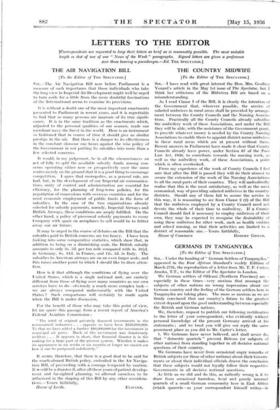THE COUNTRY MIDWIFE
[To the Editor of THE SPECTATOR.] SIR,--T have read with great interest the Hon. Mrs. Geoffrey Youard's article in the May 1st issue of The Spectator, but I think her criticisms of the Midwives Bill are based on a misunderstanding.
As I read Clause I of the Bill, it is clearly the intention of the Government that, wherever possible, the service of salaried midwives in rural areas shall be provided by arrange- ment between the County Councils and the Nursing Associa- tions. Practically all the County Councils already subsidise the midwifery work of these Associations, and under the Bill they will be able, with the assistance of the Government grant, to provide whatever money is needed by the County Nursing Associations to enable them to appoint district nurse-midwives in those rural areas which are at present without them. Recent answers in Parliament have made it clear that County Councils already have power, under Section 67 of the Poor Law Act, 1930, to contribute towards the nursing work, as well as the midwifery work, of these Associations; a point which is often overlooked.
From my experience of the work of County Councils I feel sure that after the Bill is passed they will do their utmost to secure the extension of the work of the Nursing' Associations to all the rural parts of their counties. They will undoubtedly realise that this is the most satisfactory, as well as the most economical, way of providing salaried midwives in the country districts. Should any of them fail to secure the service in this way, it is reassuring to see from Clause 2 (2) of the Bill that the midwives employed by a County Council need not devote the whole of their time to midwifery. If a County Council should find it necessary to employ midwives of their own, they may be expected to recognise the desirability of using these midwives for other work, such as health visiting and school nursing, so that their activities are limited to a district of reasonable size.—Yours faithfully,






















































 Previous page
Previous page